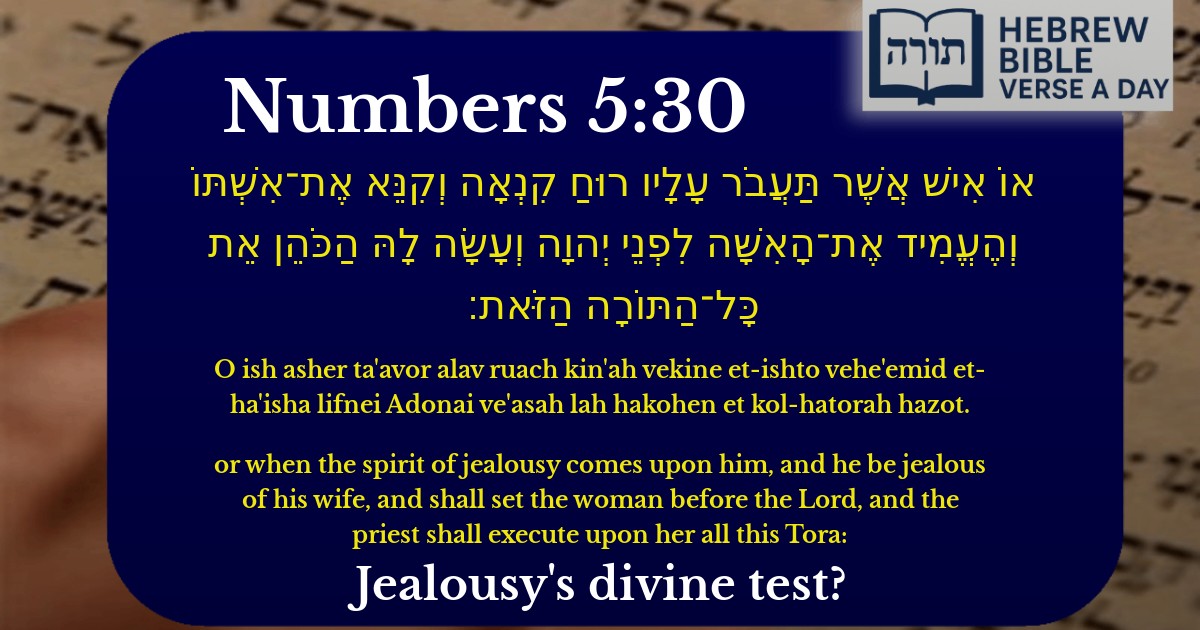Join Our Newsletter To Be Informed When New Videos Are Posted
Join the thousands of fellow Studends who rely on our videos to learn how to read the bible in Hebrew for free!
Hebrew Text
אוֹ אִישׁ אֲשֶׁר תַּעֲבֹר עָלָיו רוּחַ קִנְאָה וְקִנֵּא אֶת־אִשְׁתּוֹ וְהֶעֱמִיד אֶת־הָאִשָּׁה לִפְנֵי יְהוָה וְעָשָׂה לָהּ הַכֹּהֵן אֵת כָּל־הַתּוֹרָה הַזֹּאת׃
English Translation
or when the spirit of jealousy comes upon him, and he be jealous of his wife, and shall set the woman before the Lord, and the priest shall execute upon her all this Tora:
Transliteration
O ish asher ta'avor alav ruach kin'ah vekine et-ishto vehe'emid et-ha'isha lifnei Adonai ve'asah lah hakohen et kol-hatorah hazot.
Hebrew Leining Text
א֣וֹ אִ֗ישׁ אֲשֶׁ֨ר תַּעֲבֹ֥ר עָלָ֛יו ר֥וּחַ קִנְאָ֖ה וְקִנֵּ֣א אֶת־אִשְׁתּ֑וֹ וְהֶעֱמִ֤יד אֶת־הָֽאִשָּׁה֙ לִפְנֵ֣י יְהֹוָ֔ה וְעָ֤שָׂה לָהּ֙ הַכֹּהֵ֔ן אֵ֥ת כׇּל־הַתּוֹרָ֖ה הַזֹּֽאת׃
א֣וֹ אִ֗ישׁ אֲשֶׁ֨ר תַּעֲבֹ֥ר עָלָ֛יו ר֥וּחַ קִנְאָ֖ה וְקִנֵּ֣א אֶת־אִשְׁתּ֑וֹ וְהֶעֱמִ֤יד אֶת־הָֽאִשָּׁה֙ לִפְנֵ֣י יְהֹוָ֔ה וְעָ֤שָׂה לָהּ֙ הַכֹּהֵ֔ן אֵ֥ת כׇּל־הַתּוֹרָ֖ה הַזֹּֽאת׃
🎵 Listen to leining
Parasha Commentary
📚 Talmud Citations
This verse is quoted in the Talmud.
📖 Sotah 2a
The verse is discussed in the context of the laws concerning a woman suspected of adultery (Sotah), where the procedure of the bitter waters is detailed.
📖 Sotah 3a
Further discussion on the implications of the spirit of jealousy mentioned in the verse and its role in the Sotah ritual.
📖 Sotah 7b
The verse is referenced in explaining the priest's role and the specific actions he must perform during the Sotah ceremony.


The Sotah Ritual and the Spirit of Jealousy
The verse describes the procedure of the sotah (a woman suspected of adultery) when her husband is overcome by a "spirit of jealousy" (ruach kin'ah). According to Rashi (Bamidbar 5:14), this refers to a husband who warns his wife not to seclude herself with a particular man, yet she disregards his warning, leading to his suspicion. The Talmud (Sotah 2b) states that the sotah procedure is a unique divine ordinance intended to restore peace between husband and wife.
The Role of the Kohen
The verse emphasizes that the woman is brought "before Hashem" (to the Mishkan or Beis HaMikdash) and that the Kohen administers the ritual. Rambam (Hilchos Sotah 3:1) explains that this underscores the sanctity of the procedure, as it is not merely a judicial matter but a spiritual test invoking Hashem's name. The Kohen's involvement ensures the process is conducted with proper reverence and adherence to halacha.
The Purpose of the Sotah Test
The Suspicion of Jealousy
The term kin'ah (jealousy) here refers to a husband's legitimate suspicion based on observable circumstances, not baseless accusations. The Talmud (Sotah 3a) distinguishes between a husband who has genuine grounds for suspicion (mekaneh al yedei devarim) and one who acts out of irrational jealousy. Only the former case warrants the sotah procedure.